10 taboo foods for uterine fibroids

|
The 10 foods that are not recommended for uterine fibroids include high-fat foods, high-sugar foods, spicy foods, caffeinated drinks, alcohol, high-salt foods, processed foods, red meat, dairy products, and greasy foods. They are as follows: 1. High-fat foods: High-fat foods may increase estrogen levels and aggravate the symptoms of uterine fibroids. Representative foods include fatty meat, fried foods, cream, etc. 2. High-sugar foods: High-sugar foods can increase inflammation in the body, which is not conducive to the control of uterine fibroids. Representative foods include candy, cakes, soda, etc. 3. Spicy food: Spicy food may irritate the uterus and cause the pain to increase. Representative foods include chili peppers, spicy hot pot, hot sauce, etc. 4. Caffeinated drinks: Caffeine may increase the estrogen level in the body and affect the development of uterine fibroids. Representative drinks include coffee, tea, cola, etc. 5. Alcohol: Alcohol interferes with the liver's ability to metabolize estrogen, thereby aggravating the symptoms of uterine fibroids. Representative drinks include beer, red wine, and white wine. 6. High-salt foods: A high-salt diet can cause water retention in the body, aggravating edema and pain. Representative foods include pickles, preserved foods, potato chips, etc. 7. Processed food: Processed food contains a lot of additives and preservatives, which are harmful to health. Representative foods include canned food, instant noodles, sausages, etc. 8. Red meat: Red meat contains high amounts of saturated fatty acids and cholesterol, which may stimulate estrogen secretion. Representative foods include beef, mutton, pork, etc. 9. Dairy products: Some dairy products may contain hormone residues, which may affect the hormone balance in the body. Representative foods include whole milk, cheese, ice cream, etc. 10. Greasy food: Greasy food will increase the gastrointestinal burden and affect nutrient absorption. Representative foods include fried chicken, fried dough sticks, French fries, etc. Patients with uterine fibroids need to pay attention to menstrual conditions, such as increased menstrual flow, prolonged menstrual periods, and irregular menstrual cycles. Check for any abnormalities, such as abdominal pain, abdominal masses, and increased leucorrhea. Perform gynecological ultrasound and other examinations at intervals recommended by the doctor to monitor changes in the size, number, and location of the fibroids. |
<<: Traditional Chinese medicine says that ovulation bleeding is a good thing
>>: Does a uterine fibroid of 13.5x9mm require surgery?
Recommend
Is it better to bleed or not bleed after abortion?
Bleeding after an abortion is not necessarily goo...
How to get rid of the pain of ectopic pregnancy
How to get rid of the pain of ectopic pregnancy? ...
How to determine whether your menstruation is regular?
How to judge whether your menstruation is normal?...
Why do you get cervicitis? Experts answer your questions
Experts in our hospital say that there are many c...
Will ovarian cysts cause acne on the face? What are the main symptoms?
Many women don’t know enough about ovarian cysts ...
What are the causes of endometrial tuberculosis?
We need to pay attention to some common diseases,...
Simple mild symptoms of cervicitis
Simple mild symptoms of cervicitis: In daily life...
Can we still eat radishes and onions after they sprout? Nutrition experts reveal: "These" foods are more nutritious after sprouting
Many housewives have the experience of leaving ra...
Which hospital is good for treating irregular menstruation?
Which hospital is good for treating irregular men...
What are the precautions for uterine myomectomy?
Correctly understanding the precautions of hyster...
Is bacterial vaginosis a STD?
Many female friends associate bacterial vaginosis...
There are three possible situations of cervical erosion in women. You should pay attention to these when treating cervical erosion.
Many women get worried when they hear the word &q...
What tests are needed for uterine effusion
Uterine effusion is mainly caused by inflammatory...
What should I do if my period hurts?
What should I do if my period hurts? Menstrual pa...
What are the anti-inflammatory treatments for adnexitis?
The treatment of adnexitis is based on the princi...









